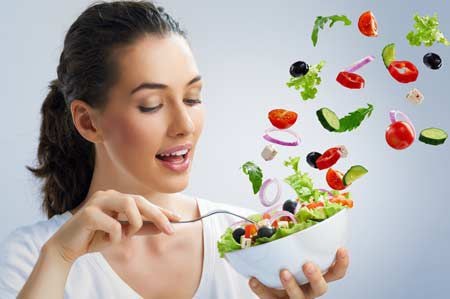How to eat balanced nutrition?
A balanced diet is essential for life.
Because organs and tissues in the body need the right nutrients to function effectively. Otherwise, the body will easily get sick, infected, tired, and have poor learning and working efficiency.
Children with nutritionally unbalanced diets will have problems with growth and development. The skyrocketing rates of obesity and diabetes are typical examples of nutritional imbalances. According to medical experts, 4 of the 10 leading causes of death are due to the impact of nutrition, including: stroke, cancer, cardiovascular disease, diabetes.
 |
| Illustration photo - internet source |
What are calories?
The number of calories in a meal is a measure of the energy stored in the food from that meal. Our bodies use calories from food to walk, think, breathe, and do all other activities. On average, a person needs to "take in" about 2,000 calories a day to maintain their body weight. Each person's daily calorie intake depends on age, gender, level of physical activity, etc.
Avoid foods that contain "empty" calories as well as foods that provide little or no nutritional value. The United States Department of Agriculture (USDA) defines "empty" or "non-essential" calories as calories from sugar and solid fats such as butter... We consume "empty" calories from food sources such as: bacon, sausages, candy, cheese, energy drinks, canned fruit juice, ice cream, pizza, carbonated drinks...
Balanced nutrition meal
A nutritionally balanced meal includes the following essential components:
Fruit: Choose fresh fruit that is available in season, limit canned fruit.
Vegetables: Are the main source of essential vitamins and minerals for the body. Vegetables that should be eaten daily include: spinach, kale, green beans, broccoli...
Grains (rice, wheat, corn, beans, sorghum, potatoes): Eat whole grain foods. Nowadays, people tend to consume refined white flour. However, in the process of refining flour, it is unfortunate that the outer shell of the grain, which contains the most nutrients, is removed!
Protein: Meat, fish and legumes such as green beans, string beans, and peas are the best sources of protein. They are essential for muscle growth and brain development. Protein from lean meats, lean cuts of meat such as chicken, some lean cuts of beef, pork and protein from fish are the best choices.
Another great source of protein is nuts. Every day, remember to "snack" on a few types of nuts such as cashews, almonds, walnuts, sunflower seeds. In addition, tofu and soy products are also valuable sources of protein.
Milk and dairy products: Provide the body with calcium, vitamin D and other essential nutrients. However, milk and dairy products are also high in fat, so choose products that have reduced or no fat.
Oils: Oils provide essential fats for the body, such as olive oil. When mixing vegetables for salad, it is a good idea to add a little olive oil.
To have a balanced meal, we also need to avoid or limit alcohol, reduce salt, sugar, solid fat, and saturated fat.
Daily calorie requirement
- Children 2-8 years old: 1,000-1,400 calories.
- Women 14-30 years old (physically active): 2,400 calories; women 14-30 years old (not physically active): 1,800-2,000 calories.
- Men 14-30 years old (physically active): 2,800-3,000 calories; men 14-30 years old (not physically active): 2,000-2,600 calories.
- Men and women over 30 years old (physically active): 2,200-3,000 calories; men and women over 30 years old (not physically active): 1,800-2,000 calories.
According to Alobacsi.vn






